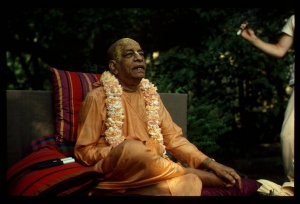740119 - Morning Walk - Honolulu

A.C. Bhaktivedanta Swami Prabhupada
Prabhupāda: (japa) . . . spoil this tree. Everything, their business is spoiling.
Kṛṣṇa-caitanya: The day before yesterday we were driving down the road and we came across all of these coconut trees, and they were trimming them, and all of the coconuts were up on the trees, but they were cutting them down, letting them just fall to the ground. And the coconuts were cracking and just being wasted completely. And then they'd throw them in the garbage. And there's so much energy that Kṛṣṇa has provided here that they're just wasting.
Prabhupāda: As they are wasting, they will be punished. Kṛṣṇa's supplied, and they're wasting. That will be punished.
(break) . . . those coconuts . . .
Kṛṣṇa-caitanya: Excuse me?
Prabhupāda: Coconut, you collect, and each one of you use at least two coconuts daily, drinking water and the pulp. It is very digestive and nutritious. The pulp is very nutritious and digestive. If you simply take the pulp from two sides and drink that water, you don't require to eat anything, it is so nutritious. So better collect, and so long you can get them, use two coconuts daily yourself. (japa) (break) . . . what it is? that Kṛṣṇa, and when he'll ask his man to "Give me that Kṛṣṇa Book, let me read," this "Kṛṣṇa" will give him some benefit, his calling "Kṛṣṇa Book"
Kṛṣṇa-caitanya: Just by saying "Kṛṣṇa Book," he makes spiritual advancement?
Prabhupāda: Yes, yes. (japa) (break) . . . say: "Give me Kṛṣṇa Book." They say like that? Eh?
Devotee (1): Last night a boy came up and asked, "How much are those books?" and he wanted to purchase one. It was very nice.
Devotee (2): Prabhupāda, one time we went to a shopping center, and I was walking down the sidewalk and a boy came running up to me and he said, "Is that Volume Two?" And he said: "Can I have Volume Two?" He said: "I've almost finished Volume One, and I was in so much anxiety that I was going to not have anything else to read, because they're so beautiful." And he said that he works in a candy store, and he has so much anxiety all day from all the people that just give him problems, and he doesn't like the work and he doesn't like the people. But he says that lunchtime he goes and every day he reads the Kṛṣṇa Book, and he says he comes back feeling so high. (laughter) (break)
Praghoṣa: . . . so he came up and he asked me to look into . . . if I could show him the Kṛṣṇa Book for a second. And he had two friends with him, and he said: "Here, I would like to show you boys something," and he said: "Do you mind?" And I said: "No." So I handed him the Volume One, and he opened it up to that picture of Kṛṣṇa with Śrīmatī Rādhārāṇī, playing His flute, and he showed the boy and he said: "Look, isn't He beautiful?" just like that, and they both looked at Kṛṣṇa and said: "Wow," just like that. (laughter)
Prabhupāda: Yes, the very picture is attractive, Rādhā-Kṛṣṇa. (japa) (break)
Devotee (3): . . . Kṛṣṇa consciousness?
Prabhupāda: Oh, yes. Very, very effective. Just like the man is feeling benefited that, "I become tired and I read this book, very nicely." So he'll gradually become devotee. (break)
Devotee (2): . . . this is on chanting hari-nāma in the streets, chanting Hare Kṛṣṇa in the streets with mṛdaṅgas and karatālas. It's a very important part of our program. Is that correct?
Prabhupāda: Both of them are kīrtana. When you chant, that is also kīrtana, when you distribute book, that is also kīrtana. When you read book, that is also kīrtana. (break) . . . joking, if one meets one fat man, so the other man will ask him, "Will you kindly let me know wherefrom you purchase rice?" (laughter)
Sudāmā: They consume much rice?
Prabhupāda: Eh?
Sudāmā: In India. Is much rice consumed?
Prabhupāda: No . . . in Bengal. In Bengal the staple food is rice. Like Japanese.
Sudāmā: Yes.
Prabhupāda: General people, they eat rice and fish, especially Bangladesh. They have got enough quantity of fishes. So they use rice and fish. Harer nāma, harer nāma, harer nāma . . . (CC Adi 17.21). (end)
- 1974 - Morning Walks
- 1974 - Lectures and Conversations
- 1974 - Lectures, Conversations and Letters
- 1974-01 - Lectures, Conversations and Letters
- Morning Walks - USA
- Morning Walks - USA, Hawaii
- Lectures, Conversations and Letters - USA
- Lectures, Conversations and Letters - USA, Hawaii
- Audio Files 05.01 to 10.00 Minutes
- 1974 - New Audio - Released in October 2014